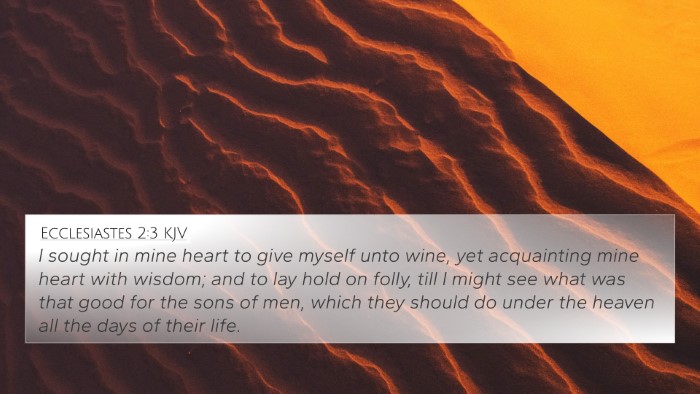Old Testament
Genesis Exodus Leviticus Numbers Deuteronomy Joshua Judges Ruth 1 Samuel 2 Samuel 1 Kings 2 Kings 1 Chronicles 2 Chronicles Ezra Nehemiah Esther Job Psalms Proverbs Ecclesiastes Song of Solomon Isaiah Jeremiah Lamentations Ezekiel Daniel Hosea Joel Amos Obadiah Jonah Micah Nahum Habakkuk Zephaniah Haggai Zechariah MalachiEcclesiastes 6:11 Similar Verses
Ecclesiastes 6:11 Cross References
Seeing there be many things that increase vanity, what is man the better?
Uncover the Rich Themes and Topics of This Bible Verse
Listed below are the Bible themes associated with Ecclesiastes 6:11. We invite you to explore each theme to gain deeper insights into the Scriptures.
Ecclesiastes 6:11 Cross Reference Verses
This section features a detailed cross-reference designed to enrich your understanding of the Scriptures. Below, you will find carefully selected verses that echo the themes and teachings related to Ecclesiastes 6:11 KJV. Click on any image to explore detailed analyses of related Bible verses and uncover deeper theological insights.

Ecclesiastes 4:16 (KJV) »
There is no end of all the people, even of all that have been before them: they also that come after shall not rejoice in him. Surely this also is vanity and vexation of spirit.

Ecclesiastes 5:7 (KJV) »
For in the multitude of dreams and many words there are also divers vanities: but fear thou God.

Psalms 73:6 (KJV) »
Therefore pride compasseth them about as a chain; violence covereth them as a garment.

Ecclesiastes 1:17 (KJV) »
And I gave my heart to know wisdom, and to know madness and folly: I perceived that this also is vexation of spirit.

Ecclesiastes 1:6 (KJV) »
The wind goeth toward the south, and turneth about unto the north; it whirleth about continually, and the wind returneth again according to his circuits.

Ecclesiastes 3:19 (KJV) »
For that which befalleth the sons of men befalleth beasts; even one thing befalleth them: as the one dieth, so dieth the other; yea, they have all one breath; so that a man hath no preeminence above a beast: for all is vanity.

Ecclesiastes 4:1 (KJV) »
So I returned, and considered all the oppressions that are done under the sun: and behold the tears of such as were oppressed, and they had no comforter; and on the side of their oppressors there was power; but they had no comforter.

Ecclesiastes 2:3 (KJV) »
I sought in mine heart to give myself unto wine, yet acquainting mine heart with wisdom; and to lay hold on folly, till I might see what was that good for the sons of men, which they should do under the heaven all the days of their life.

Ecclesiastes 4:8 (KJV) »
There is one alone, and there is not a second; yea, he hath neither child nor brother: yet is there no end of all his labour; neither is his eye satisfied with riches; neither saith he, For whom do I labour, and bereave my soul of good? This is also vanity, yea, it is a sore travail.

Hosea 12:1 (KJV) »
Ephraim feedeth on wind, and followeth after the east wind: he daily increaseth lies and desolation; and they do make a covenant with the Assyrians, and oil is carried into Egypt.
Ecclesiastes 6:11 Verse Analysis and Similar Verses
Understanding Ecclesiastes 6:11
Ecclesiastes 6:11 states: “The more words, the less meaning, and how does that profit anyone?” This verse serves as a reflection on the futility of excessive speech and the search for meaning in life. Below is a summary of interpretations from various public domain commentaries.
Insights from Public Domain Commentaries
Matthew Henry's Commentary: Henry emphasizes the vanity of human endeavors and pursuits. He notes that an abundance of words can lead to confusion and misinterpretation, ultimately failing to provide any real benefit. It points towards the importance of wisdom and understanding over mere speech.
Albert Barnes' Notes: Barnes highlights that this verse implies that speaking much does not necessarily improve understanding or provide profit. He reflects on the notion that life may contain many words, yet they often lack substance. The pursuit of wisdom is more valuable than the proliferation of words.
Adam Clarke’s Commentary: Clarke points out the context of the verse in relation to the futility of striving in life without a purpose. He suggests that idle chatter and excessive words reveal a lack of real knowledge or experience, leading to emptiness rather than fulfillment.
Bible Cross-References and Connections
This verse connects with several others that discuss similar themes of the futility of excessive speech and the pursuit of wisdom. Here are important cross-references to consider:
- Proverbs 10:19: “When words are many, sin is not absent, but he who holds his tongue is wise.” This emphasizes the virtue of restraint in speech.
- Ecclesiastes 5:2: “Do not be quick with your mouth, do not be hasty in your heart to utter anything before God.” This advises caution and thoughtfulness in our communication.
- James 1:19: “Everyone should be quick to listen, slow to speak and slow to become angry.” This verse highlights the importance of listening over speaking.
- Proverbs 17:28: “Even fools are thought wise if they keep silent, and discerning if they hold their tongues.” Silence often speaks louder than words.
- Proverbs 18:2: “Fools find no pleasure in understanding but delight in airing their own opinions.” This demonstrates the value of seeking understanding over merely expressing oneself.
- Matthew 12:36-37: “But I tell you that everyone will have to give account on the day of judgment for every empty word they have spoken.” This highlights the seriousness of our spoken words.
- Ecclesiastes 3:7: “A time to tear and a time to mend, a time to be silent and a time to speak.” This suggests the need for discernment regarding when to use words.
Thematic Connections
Ecclesiastes 6:11 relates to broader themes within the Bible about the use of words and the pursuit of wisdom:
- The Value of Wisdom: Many scriptures emphasize the pursuit of wisdom as more beneficial than speaking numerous words without insight.
- The Power of Words: Biblical texts consistently address the impact of our speech, urging believers to choose their words carefully.
- The Importance of Listening: Emphasizing that often, less speech yields greater understanding and wisdom.
Conclusion
Ecclesiastes 6:11 serves as a poignant reminder of the limitations of human speech. The verse encourages believers to seek wisdom and to be mindful of their words, reinforcing the biblical understanding that meaningful dialogue often requires more listening than speaking. For deeper study, practitioners may consider employing tools for Bible cross-referencing and thematic study to explore the connections within scripture further.


